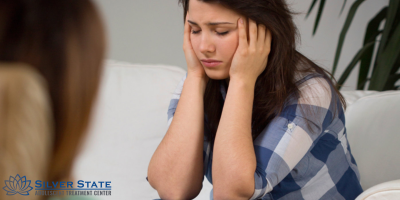Young Adult Depression Treatment For Teens Coping With DXM-Induced Dissociation

Table of Contents
Key Takeaways:
- Teens who abuse DXM (dextromethorphan) can experience severe dissociation and worsening of their depression symptoms.
- Treatment for depression in young adults must deal with both mood stabilization and trauma caused by drugs.
- Teen Therapy Programs, cognitive-behavioral strategies, and help with emotional regulation are all important parts of integrated therapeutic approaches.
- Using Las Vegas Youth Center treatment centers can give young people structured support in a safe environment.
- Looking at addiction through the lens of “How Does Drug Addiction Affect Mood and Emotional Regulation?” is very important for making good recovery plans.
Introduction
Teenagers who are dealing with DXM-induced dissociation need urgent help with young adult depression treatment. Teens who abuse DXM, which is often found in cough medicines that don’t need a prescription, put their mental and emotional health at risk. DXM abuse can cause dissociation that is similar to PCP or ketamine, and it can also make existing depression worse or start new depressive episodes. This shows how important it is to have personalized, evidence-based treatment options. Also, when treating depression in young adults, it’s important to understand how substance abuse and emotional dysregulation can be linked. It is not an option to combine addiction treatment with mental health support; it is necessary. Clinicians can better help teens deal with the harmful effects of DXM by using structured therapy, mood-stabilizing methods, and targeted support. This is true even as they work to restore the teens’ mental stability. 
What Makes Teens Who Abuse DXM More Likely To Get Hurt?
DXM (dextromethorphan) in high doses is a dissociative hallucinogen like PCP or ketamine. It can make you feel like you’re not in your body and cause hallucinations. At these levels, the drug can cause panic, chemical psychosis, trouble with motor coordination, and mood swings that are very bad. Teens are some of the most common users of DXM because it is easy to get and makes them feel better for a short time. According to the Drug Enforcement Administration, DXM misuse causes hallucinations, agitation, and dissociation that mimic more dangerous substances. Regular abuse can make depressive symptoms worse by messing up emotional regulation and brain pathways that are involved in mood and reward. 
What Are Some Good Ways To Treat Both Depression And Dissociation Caused By DXM?
Combining treatment for depression with recovery from addiction is one of the most promising approaches. Combining different types of therapy, like cognitive behavioral therapy (CBT), dialectical behavior therapy (DBT), and family counseling, can help people get their emotions back under control and learn how to deal with stress in a healthy way. Las Vegas Youth Center treatment centersoffer a safe, focused space for teens to get these therapies from professionals who are experts in addiction and mood disorders. This fits with other Teen Therapy Programs that deal with both mood disorders and drug abuse in teenagers. Psychoeducation on “How Does Drug Addiction Affect Mood and Emotional Regulation?“ is often part of these kinds of treatments. It helps teens and families understand how DXM> messes with brain chemistry, makes emotional instability worse, and makes Depression Treatment less effective.
Young adults can become more resistant to relapse by combining medication support (with medical supervision) with behavioral therapies and peer support. This will help them stabilize their mood and recover mentally.
How Can Structured Programs And Support Systems Help People Get Better?
Combining support systems like families, schools, peer groups, and professional supervision makes recovery stronger. DXM-induced dissociation can make teens feel alone and misunderstood, but structured therapeutic environments can help them feel more connected. The treatment centers at Las Vegas Youth Center treatment centers focus on preventing relapses, connecting with peers, and getting emotional support. Teaching teens how to be mindful, deal with stress, and express their feelings in a healthy way can help them heal from trauma caused by dissociation. >A U.S. Department of Justicereport highlights the rise in DXM-related emergency incidents, particularly among adolescents. Teaching families about How Does Drug Addiction Affect Mood and Emotional Regulation? helps people understand each other and work together. Getting teens involved in Depression Treatment is an important part of addiction recovery because it makes sure that mood symptoms are not just seen as side effects. Depression, especially when it gets worse because of substance-induced dissociation, needs constant care through therapy, medication (if needed), and ongoing emotional skill-building.
How Can Cannabis Use Affect the Treatment of Depression in Teens Dealing with DXM-Induced Dissociation?
Exploring cannabis effects on mental health treatment reveals mixed outcomes for teens grappling with DXM-induced dissociation. While some report temporary relief from depressive symptoms, others may experience heightened anxiety or cognitive impairment. Professional guidance is crucial to navigate these complex interactions and ensure safe, effective treatment strategies.
Conclusion
It takes specialized, integrated care to help teens with DXM-induced dissociation deal with their depression as young adults. Teenagers can start to heal emotionally and take back control by treating their addiction and depression at the same time and in places like Las Vegas Youth Center treatment centers that focus on structured therapy for teens. Setting up strong support networks, running good Teen Therapy Programs, and teaching teens and their families about How Does Drug Addiction Affect Mood and Emotional Regulation? are very important parts of getting better. If you need help for a teen who is having dissociative episodes and depression, please contact Silver State Adolescent. We are here to help and guide you. Call us today at Tel: 725.525.9897.
FAQs:
What is DXM and why is it dangerous for teens?
DXM (dextromethorphan) is a cough medicine that can cause dissociation and hallucinations in high doses. This is especially dangerous for the brains of teens who are still growing.
How does abusing DXM make people depressed?
It messes with neurotransmitter function, makes emotional dysregulation worse, and may cause or make depressive symptoms worse.
What are the signs that someone is abusing DXM?
Be on the lookout for empty cough syrup bottles, mood swings, hallucinations, poor grades, or secretive behavior.
What does good treatment for depression caused by DXM look like?
Integrated care that includes evidence-based Depression Treatment, addiction counseling, family therapy, and supportive settings like Teen Therapy Programs.
How can families help teens who are trying to get better?
By going to therapy, keeping lines of communication open, getting over-the-counter drugs, and practicing skills for controlling your emotions.
Citations:
U.S. Department of Justice.Intelligence Bulletin: DXM (Dextromethorphan). Office of National Drug Control Policy, 2011, https://www.justice.gov/archive/ndic/pubs11/11563/index.htm Drug Enforcement Administration. DXM (Dextromethorphan) Fact Sheet. DEA.gov, https://www.dea.gov/factsheets/dxm. University of California, San Francisco; S. Karami et al. “Dextromethorphan Abuse in Adolescence: A Six‑Year Retrospective Review.” PubMed Central, 2006, https://pubmed.ncbi.nlm.nih.gov/17146018/. U.S. Congress. H. Rept. 114‑672: DXM Abuse Prevention Act of 2015. Congress.gov, 2015, https://www.congress.gov/committee-report/114th-congress/house-report/672/1.

